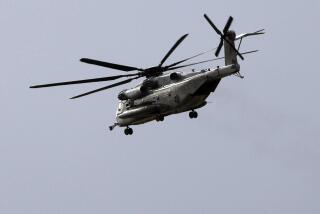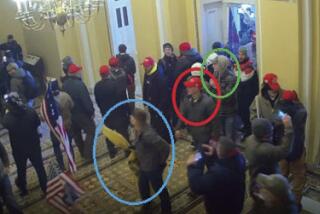Double Duty for Marines in Baghdad
- Share via
BAGHDAD — The old men playing dominoes barely looked up from their tiny, steaming cups of coffee as the U.S. Marines arrived to search for weapons in a dim and smoky coffeehouse in one of this city’s main markets.
But a few heads turned when a small cache of AK-47 assault rifles was dragged from beneath the soot-stained brick oven, and several bulging sacks of ammunition and Iraqi dinars came to light in a back storeroom.
Accompanied by a small contingent of Iraqi police, half a dozen Marines had fanned out Saturday through the market’s winding, covered alleyways -- part of a long and dusty day’s patrol that combined goodwill gestures with a state of hair-trigger readiness for urban combat.
The day’s mission was to search for illicit weapons in a part of Baghdad where U.S. troops had not previously ventured on foot: a crowded, rundown district where gunfire still crackled in the near distance.
But the Marines were also trying, on what was to be their last day in the capital before handing over policing duties to Army troops, to establish lines of communication with the crowds of Iraqis who turned out to gawk and cheer and shout out appeals for food, money, electricity and protection from looters.
“We want to get out here and show ourselves, to make the civilians feel at ease and to make the guys with guns feel nervous,” said Sgt. Daniel Marez, 28, of Albuquerque, the patrol leader. “Sometimes it’s hard to do both.”
Complicating their task was the presence of Iraqi police, who only days earlier were regarded by most people here as hated symbols of decades of repression at the hands of Saddam Hussein.
In the wake of the looting that accompanied the capital’s fall, U.S. officials see an urgent need to get a police force back on the streets. Growing numbers of Iraqi police officers have been returning to work and are receiving training from U.S. troops, including Marine reservists who are police officers back home.
“They do a lot of things very differently than we do, but the bulk of them are good men who are just trying to get by,” said Staff Sgt. Jeremy Stafford, who, in civilian life, is a firearms instructor at the LAPD academy and lives in Simi Valley.
Out on joint patrols, the Marines have had to step in to prevent Iraqi police from roughing up suspects. But looters and suspected gunmen do not get gentle treatment from the Marines either.
Only moments into Saturday’s patrol, moving toward the market district in three Humvees with mounted TOW missile launchers, the Marines spotted several Iraqi men loading big canisters of looted vegetable oil into the back of a battered flatbed truck. The men tried to flee; the patrol gave chase.
“Get out! Get out NOW!” the troops, M-16s at the ready, shouted as they moved toward the truck. The men inside were dragged out and forced to lie on the ground, their hands trussed behind them with plastic ties. One of them was barefoot; another trembled as he lay on the pavement.
“It’s not fun to have to treat them like that, but we pull so many weapons out of cars that we can’t take chances,” said Matt Clayton, a Navy corpsman from Onawa, Iowa, attached to the Marine unit. “If we don’t move in like that, we’ll wind up shot.”
In many ways, the day’s work was emblematic of the dangers still faced by any occupying force in a densely packed city of 5 million people.
Moments of high tension punctuated the easy rapport shared by the men, who had fought their way through the southern desert together and were among the first American units to arrive in Baghdad.
When the Marines moved on foot into the marketplace, covering one another as they made their way around corners and into alleyways, Iraqi police officer Mowaid Sayeed studied their procedures and protocols.
“It’s very interesting how they move, how they split up, but they each know where the other ones are and what they are doing, and how they signal to one another,” he said, adding wistfully: “Also, their weapons are very, very nice.”
At the beginning of the day, most of the eight Iraqi officers accompanying the nine-member Marine patrol had no guns. As the day went on, they armed themselves with Kalashnikovs from the stock of seized munitions, which they returned to the weapons store when the patrol ended. Everywhere the Marines went, Iraqis pleaded with them to restore order.
In a poor northern neighborhood where sewage ran in open canals and half-burned scraps of garbage blew in dusty whirlwinds, 65-year-old Salah Mohammed Jambouri hobbled out, leaning heavily on his cane.
“Why are you not coming here at night? Why are we seeing you here for the first time today? The looters are picking us clean like a plucked chicken,” he said. “Soon there will be nothing left of us but our bones.”
“We’re trying, we’re trying,” one of the Iraqi officers told him.
From time to time, as the patrol swept past, a cry of “Ali Baba! Ali Baba!” -- the Iraqi term for thieves, taken from “One Thousand and One Arabian Nights” -- would rise up from the crowd. But unless it looked like a large-scale heist, the Marines could not stop each time to investigate.
The Marines, whose main role had been to seize the city and hold it, appeared more than ready to relinquish their duties to arriving Army troops.
“Beautiful sight,” Lance Cpl. Tanner Bates, a 22-year-old from Lubbock, Texas, murmured from atop his Humvee as he watched a convoy of Army trucks roll past.
More to Read
Sign up for Essential California
The most important California stories and recommendations in your inbox every morning.
You may occasionally receive promotional content from the Los Angeles Times.













